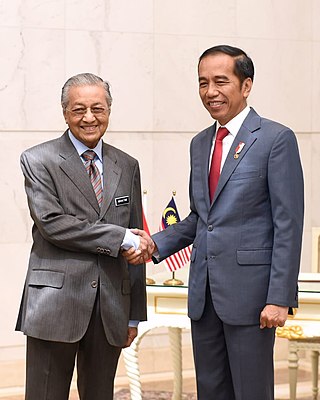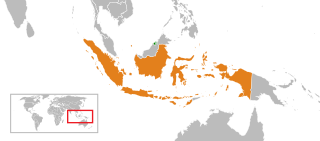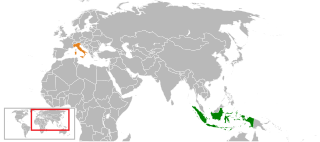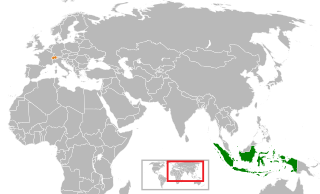
Since independence, Indonesian foreign relations have adhered to a "free and active" foreign policy, seeking to play a role in regional affairs commensurate with its size and location but avoiding involvement in conflicts among major powers. During the presidency of Sukarno, Indonesia's foreign relations were marked by engagement with other newly independent nations in Asia and Africa, as exemplified by the Bandung Conference, the subsequent foundation of the Non-Aligned Movement and a confrontational attitude towards Western powers, justified by a belief in the CONEFO and opposition to what Sukarno termed as NEKOLIM.

Indonesia–Pakistan relations refer to the diplomatic relations between the Republic of Indonesia and the Islamic Republic of Pakistan, which were established in 1955. Indonesia has the world's largest Muslim population, while Pakistan has the world's second-largest Muslim population. Unlike Pakistan, Indonesia is a constitutionally secular state and does not endorse Islam as its state religion; however, both countries are member states of the Organization of Islamic Cooperation. The two states are also part of the Developing 8. Pakistan has an embassy in Jakarta, while Indonesia maintains an embassy and a consulate-general in Islamabad and Karachi, respectively. According to a 2014 BBC World Service poll, 40% of Indonesians view Pakistan's influence positively, with 31% expressing a negative view.

Indonesia and Portugal established diplomatic relations in 1950. Portuguese explorer and trader first reached Indonesian archipelago during the age of exploration in the 16th century in order to search for spices in the Indies.

Egypt and Indonesia established diplomatic relations in 1947. Both are Muslim-majority countries with significant non-Muslim minorities. Indonesia has an embassy in Cairo and Egypt has an embassy in Jakarta. Both countries are members of the Organisation of Islamic Cooperation, Non-Aligned Movement, the G20 developing nations and Developing 8 Countries. Egypt was also the first sovereign country to recognise Indonesia's independence; doing so in 1946, three years before its formal, internationally-recognised independence date.

Indonesia and Myanmar established diplomatic relations in 1949. Indonesia has an embassy in Yangon, while Myanmar has an embassy in Jakarta.

Brunei Darussalam and Indonesia established diplomatic relations in 1984. Since then, both country enjoys warm and friendly relations. Brunei has an embassy in Jakarta, while Indonesia has an embassy in Bandar Seri Begawan. Indonesia and Brunei don't share direct land borders. Since diplomatic relations were established back in 1984, Overall relations between the two countries were progressing well and that both sides continued to enjoy strong ties in a wide spectrum of co-operations; including trade and investment, tourism, agriculture, marine and fisheries, health, defence, transnational crimes, education, youth, culture and people-to-people contacts.

Bangladesh and Indonesia established diplomatic relations in 1971. Indonesia is the world's largest Muslim country, whereas Bangladesh is the world's fourth largest Muslim country. They are partners in the United Nations and various multilateral organisations, particularly in international peacekeeping, the Developing 8 Countries, the Non-Aligned Movement, the World Trade Organization and the Organisation of Islamic Cooperation. Bangladesh has an embassy in Jakarta, whereas Indonesia has an embassy in Dhaka. Official diplomatic relations were established in 1972 after Indonesia became one of the first Muslim countries to recognise independent Bangladesh.

Indonesia and the United Arab Emirates (UAE) established diplomatic relations in 1976. The diplomatic relations are important because both share the solidarity as Muslim majority countries. Indonesia has an embassy in Abu Dhabi, while the United Arab Emirates has an embassy in Jakarta. Both countries are members of the World Trade Organization (WTO), The Non-Aligned Movement and Organisation of Islamic Cooperation (OIC).

Indonesia and Italy established diplomatic relations on 29 December 1949. Italy has shown strong desire to improve its relations with Indonesia, especially in intercultural understanding and trade. Indonesia recognizes Italy's strategic location and important role in the middle of Mediterranean region, while Italy has favoured relations with Indonesia, and sees Indonesia as the leader in Southeast Asia. The relations between two countries not only important to bridge the two regional communities; European Union and ASEAN, but also vital as intercultural and interfaith dialog, since Indonesia has the largest Muslim population in the world, and Italy is the heart of the Catholic faith.

Indonesia and Morocco established diplomatic relations in 1960. Both are the Muslim-majority countries; Indonesia is the most populous Muslim country in the world, while Morocco is also a Muslim majority nation. Morocco praised Indonesia as a strong democratic nation, and pointed out that both nations face the same challenges of separatism and terrorism. Diplomatic relations were established in 1960. Indonesia has an embassy in Rabat and a consulate in Casablanca, while Morocco has an embassy in Jakarta. Both nations are members of the World Trade Organization (WTO), Group of 77, Non-Aligned Movement and Organisation of Islamic Cooperation (OIC).

Algeria and Indonesia established diplomatic relations in 1963. The relationship is mostly founded on common religious and anti-colonialism solidarity, as Indonesia and Algeria are Muslim-majority countries that also once fell under colonialism. Algeria recognized Indonesia's role on supporting their country on gaining independence in 1962. Both countries agreed on expanding cooperations and strengthening relations. Algeria has an embassy in Jakarta that also accredited to Singapore and Brunei, while Indonesia has an embassy in Algiers. Both nations are members of the Non-Aligned Movement, Group of 77 and Organisation of Islamic Cooperation (OIC).

Indonesia and Switzerland established diplomatic relations in 1952. In 2010, the heads of state of the two countries agreed to launch negotiations on a Comprehensive Economic Partnership Agreement (CEPA). Switzerland has named Indonesia as one of seven priority countries for economic development cooperation. Indonesia has an embassy in Bern, while Switzerland has an embassy in Jakarta, also accredited for East Timor and ASEAN.

Indonesia and Iran established diplomatic relations in 1950. Indonesia has an embassy in Tehran, and Iran has an embassy in Jakarta. Both countries are full members of the World Trade Organization (WTO), The Non-Aligned Movement, Organisation of Islamic Cooperation (OIC), and Developing 8 Countries.

Indonesia and Saudi Arabia established diplomatic relations in 1950. Relations are particularly important because Saudi Arabia is the birthplace of Islam, and Indonesia is home to the world's largest Muslim population; both are Muslim majority countries. Economy and trade relations are also particularly important, especially on oil (energy) and human resources sectors. Saudi Arabia has an embassy in Jakarta, while Indonesia has an embassy in Riyadh and a consulate in Jeddah. Both countries are members of the Organisation of Islamic Cooperation and G-20 major economies.

Indonesia–Yemen relations are current and historical bilateral relations between Indonesia and Yemen since 21 April 1962. Indonesia and Yemen shared similarity as the Muslim majority countries, Indonesia is the most popular Muslim country in the world, while Yemen also a Muslim majority nation. Indonesia has an embassy in Sana'a, while Yemen has an embassy in Jakarta. Both the countries have many cultural proximities and similar view on international issues and these nations are members of the Non-Aligned Movement, Indian-Ocean Rim Association and Organisation of Islamic Cooperation (OIC).

Jordan and Indonesia established diplomatic relations in 1950. Both are Muslim majority countries who, despite the challenges, wish to promote and projects the Islamic values of tolerance, justice and equality. Both nations often share similar stances upon issues in the Middle East, such as the Syrian Civil War and the Israeli–Palestinian conflict. Economy and trade relations are also particularly important, currently Indonesia is Jordan's largest trade partner in ASEAN. Jordan has an embassy in Jakarta, while Indonesia has an embassy in Amman that is also accredited to Palestine. Both countries are members of the Organisation of Islamic Cooperation and the Non-Aligned Movement.

Indonesia–Sudan relations was officially established in 1960. In February 2012, during a visit of Sudanese Foreign Minister Ali Karti to Jakarta, Indonesia and Sudan has agreed to foster bilateral relations in politics, science, education and economic sectors. Indonesia has an embassy in Khartoum, while Sudan has an embassy in Jakarta. Both countries have Muslim-majority population and both are members of Organisation of Islamic Cooperation.

Indonesia–Syria relations was officially established in 1949, and it was among earliest international recognitions on Indonesian sovereignty. Both nations have common perceptions related to Palestine, Iraq and Lebanon issues, and Indonesia always supports Syria in international forum on the issue of the Golan Heights. Regarding the current events of the Syrian Civil War, Indonesia has urged all parties in Syria to end the violence, while pledging to provide US$500,000 worth of humanitarian assistance to conflict-torn Syria in 2014. Previously Indonesia has donated the same amount to Syria in 2012 and 2013 under United Nations. Indonesia has an embassy in Damascus, while Syria has an embassy in Jakarta. Both nations are the member of Non-Aligned Movement and Organisation of Islamic Cooperation.

Indonesia–Kazakhstan relations refer to bilateral relations between Indonesia and Kazakhstan. The two countries officially established relations in 1993 and share some similarities; both countries possess abundance of natural resources, have predominantly Muslim populations, ensure harmonious diversity and a commitment to human rights and democracy. Both nations have agreed to increase cooperation in several economic sectors, such as agriculture, industry, pharmaceuticals, petroleum, transportation infrastructure and machinery manufacture. Indonesia has an embassy in Astana, while Kazakhstan has an embassy in Jakarta. Both nations are member of Organisation of Islamic Cooperation.

Indonesia–Oman relations was officially established in 1978. Indonesia and Oman are Muslim majority countries and shares same commitment in pursuing global peace and prosperity. Indonesia has an embassy in Muscat, while Oman has an embassy in Jakarta. Both countries are the member of Organization of Islamic Cooperation and also Non Aligned Movement.






















